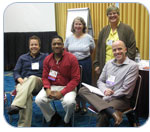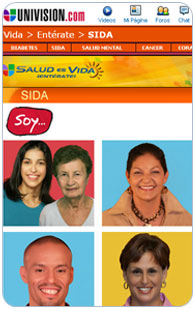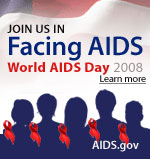Looking Back, Moving Forward

Last week we attended the United States Conference on AIDS  (USCA), sponsored by the National Minority AIDS Council (NMAC). USCA is the largest AIDS-related gathering in the U.S. Three-thousand people came together to share information, create new networks, and learn about the latest tools being used to address the challenges of HIV/AIDS. Conference participants included healthcare and service providers, advocates, people living with HIV/AIDS, and policymakers. The theme of the conference was “Looking Back, Moving Forward.”
(USCA), sponsored by the National Minority AIDS Council (NMAC). USCA is the largest AIDS-related gathering in the U.S. Three-thousand people came together to share information, create new networks, and learn about the latest tools being used to address the challenges of HIV/AIDS. Conference participants included healthcare and service providers, advocates, people living with HIV/AIDS, and policymakers. The theme of the conference was “Looking Back, Moving Forward.”
New Media at USCA
Our time at USCA was spent looking forward to a future where new media will be a standard part of HIV messaging--but we aren’t there yet. Below, we highlight some examples of how our colleagues are using new media to reach target populations at risk for HIV/AIDS:
Plenary Session
- The USCA conference opened with the Soy (I am)
 project, a joint venture
project, a joint venture  between Univision and the Kaiser Family Foundation (KFF). Soy tells the stories of individual Latinos living with HIV/AIDS. The project debuts just in time for National Latino AIDS Awareness Day. KFF also provided a webcast
between Univision and the Kaiser Family Foundation (KFF). Soy tells the stories of individual Latinos living with HIV/AIDS. The project debuts just in time for National Latino AIDS Awareness Day. KFF also provided a webcast  of USCA’s opening session.
of USCA’s opening session.
Workshops
- Thomas Henning, from Cable Positive
 , discussed how nonprofits can use new media to reach new clients. He discussed how to find free or inexpensive resources to help with using new media tools and highlighted Cable Positive’s popular, rights-free, public service announcements
, discussed how nonprofits can use new media to reach new clients. He discussed how to find free or inexpensive resources to help with using new media tools and highlighted Cable Positive’s popular, rights-free, public service announcements  .
. - The Northwest AIDS Education and Training Center
 (NAETC) offered a workshop entitled Employing Innovative Technology in HIV Clinical Training for Underserved Communities. NAETC has a useful website
(NAETC) offered a workshop entitled Employing Innovative Technology in HIV Clinical Training for Underserved Communities. NAETC has a useful website  that provides case-based modules on HIV/AIDS diagnosis and treatment for minority and minority-serving health care providers.
that provides case-based modules on HIV/AIDS diagnosis and treatment for minority and minority-serving health care providers. - The Los Angeles Gay & Lesbian Center
 presented on a new web series, In The Moment
presented on a new web series, In The Moment  , that follows a group of gay men living in Los Angeles and chronicles their decision-making around sexual health.
, that follows a group of gay men living in Los Angeles and chronicles their decision-making around sexual health.
Roundtables and Discussions

Participants at AIDS.gov discussion, counterclockwise: Deb LeBel, Valerie Kapp, Michael LaFlam, Angel Gonzalez, and Doug Weinbrenner.
- Miguel Chion and Monica Nuño of Accion Mutua
 , a joint program of AIDS Project Los Angeles
, a joint program of AIDS Project Los Angeles  and the César E. Chávez Institute
and the César E. Chávez Institute  , offered a roundtable on how to use webinars to reach communities with HIV prevention, testing, and treatment messages.
, offered a roundtable on how to use webinars to reach communities with HIV prevention, testing, and treatment messages. - AIDS.gov sponsored a discussion group entitled “Let’s Talk About New Media.” Participants echoed what we heard at the International AIDS Conference and from others at USCA: our target audiences are using the Web to find health information and make healthcare decisions.
Other New Media
- amFar
 and POZ
and POZ  are producing videos for their webpages, and YouTube carries a video by POZ on Latino and Asian/Pacific Islander HIV/AIDS Awareness Days.
are producing videos for their webpages, and YouTube carries a video by POZ on Latino and Asian/Pacific Islander HIV/AIDS Awareness Days. - NMAC twittered
 from the conference. (To learn more about Twitter, see this post.)
from the conference. (To learn more about Twitter, see this post.)
Interviews
As we did in Mexico City, the AIDS.gov team did informal interviews with USCA participants about their use of new media. The consensus among our colleagues was that people are starting to incorporate new media into their work, but the challenges are real and there is plenty of room for improvement.
Doug Weinbrenner, from Good Samaritan Services  in Kansas City told us: “We are just skimming the surface of what we can do.”
in Kansas City told us: “We are just skimming the surface of what we can do.”
Susan Cohen, director of the Los Angeles Gay & Lesbian Center’s  Department of Health Education and Prevention, and part of the team that produces In The Moment
Department of Health Education and Prevention, and part of the team that produces In The Moment  , said “We are continuously learning from our audience about how to plan for this new environment. That means considering everything from what to do when the computers start crashing to asking ourselves hard questions, like ‘Are we serving our audience?’” She also said, “The HIV community needs to assess the utilization of new media. Our target audiences are using these tools and we have to meet them where they are.”
, said “We are continuously learning from our audience about how to plan for this new environment. That means considering everything from what to do when the computers start crashing to asking ourselves hard questions, like ‘Are we serving our audience?’” She also said, “The HIV community needs to assess the utilization of new media. Our target audiences are using these tools and we have to meet them where they are.”

Monico Nuño, Capacity Building Specialist, Acción Mutua
Monica Nuño told us, “So many of those we work to reach use technology in their social lives. We use technology tools in our work to bridge the gap between home and work, bring information to people, and make it interactive. We have to meet providers where they are and make our information available on the platforms they use.”
Gustavo Aldolfo Morales Correa with Entre Amigos  told us: “We’ve been engaging clients on MySpace in Puerto Rico for several years, but we know we have to step up our game. Our clients began by networking through us, but they quickly developed independent social networks—we have to reconsider how to engage with them.”
told us: “We’ve been engaging clients on MySpace in Puerto Rico for several years, but we know we have to step up our game. Our clients began by networking through us, but they quickly developed independent social networks—we have to reconsider how to engage with them.”
Moving Forward
Our colleagues (AIDS service organizations, health leaders, and national HIV advocates) told us they wanted technical assistance on how to use, evaluate, and work collaboratively on new media. They also told us they want more opportunities to TALK about using new media - and how we can challenge our communities to use these tools, as appropriate.
What are you doing to make your HIV/AIDS information and resources available through new media? Please share you stories, successes, and challenges with us!





Great blog! Lots of informative stuff!
Posted by: Graceanna | September 24, 2008 at 08:42 AM
I am glad that the Internet is being used to communicate and educate all people, those with and without HIV/AIDS. As a medical transcriptionist who took patient histories in house for 10 years, I frequently met people with HIV or AIDS who were extremely reluctant to admit this because of fear of making it part of the medical record.
The ignorance and fear about HIV/AIDS by those who do not have it, and the shame/fear felt by those who do have the disease, have to be eliminated. We do no good to ourselves or to our sick brethren, by turning our backs on those who need our help the most.
Posted by: medical transcription employment | September 28, 2008 at 11:37 PM
There is no one who doesn't have a a friend /family member with HIV/Aids. We should hold hands together and help eachother, support charity organizations by donating a few pennies if you have to. Glad to see this topic was focusing on Latinos and how people are reaching out for the minority. Thank you, thank you.
Posted by: Jeff | October 03, 2008 at 07:27 AM
This site is very cool, I really like all the blog posts. Useful and interesting HIV news. I think we need more HIV education and information out there.
A useful AIDS Drugs site I found www.aidsdrugsonline.com.
Posted by: Jerry | October 06, 2008 at 11:58 PM
I would really like to see more AIDS and HIV discussion relate to rehab as it pertains to not only preventing the spread of these horrible diseases but also can potentially prevent millions of people from acquiring these diseases and other simply due to not being as at risk by not sharing needles, participating in promiscuous sex etc.
Posted by: AddictionWriter | October 07, 2008 at 04:53 PM